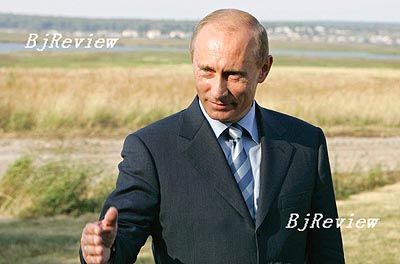|

When Vladimir Putin became Russia's president in 2000, he asked the people to give him 20 years and he would give them a powerful Russia in return. During his two terms in office, Russia has grown through the interaction of its economic development and its involvement in world affairs. But Putin's time is running out, because Russian law prohibits presidents from serving a third consecutive term.
Observers believe that Putin's recent political, diplomatic and military moves are attempts to ensure his policies continue without him when Russians elect a new president in March 2008. These moves have drawn attention - if not alarm - from other countries such as the United States, which view them as a threat to democratic reform in Russia.
Chinese foreign affairs experts said that Putin's actions not only show the growing might of Russia as well as the man himself, but also are intended to have some bearing on the man who replaces him. They believe that post-Putin Russia will march to the same beat under a loyal and Putin-groomed successor.
Growing Russian power
As a big country with political and military influence, Russia's every move attracts the world's attention. Its recent military actions indicate that it is seeking to resume its honor and power through military modernization.
In his State of the Union Address in April, Putin said that Russia was implementing a weapon equipment plan for 2007-15. Under this plan, about $167 billion will be used to purchase new weapons and military technology equipment, according to Xinhua News Agency.
In late May, Russia tested a new RS-24 continental ballistic missile and the improved Iskander-M tactical cruise missile system. In June, it launched two satellites to be used for scouting and intercepting enemy telecommunications. In early July, Russian Navy Chief Vladimir Masorin said the country would spend 9 billion rubles (about $358 million) for a modern nuclear submarine base on the Kamchatka peninsula in east Russia. On September 11, Russia tested a new type of fuel air-bomb four times more powerful than the U.S. vacuum bomb, according to Xinhua News Agency.
Xia Yishan, a senior researcher at the Chinese Institute of International Studies (CIIS), said that these actions were directly connected to Russia's growing economic strength. Equipping the country with a strong military is part of Putin's ongoing plan to rebuild a powerful Russia, he said.
Xia also pointed out that Russia's economic power under Putin has increased. With ample oil and natural gas resources, Russia reaps big benefits by playing its "energy resource card," he said. The country had paid off all its foreign debt, and its gold and foreign currency reserves reached $303.9 billion this January, according to statistics from Russia's Central Bank.
Russia under Putin has readopted its tough stance on relations with the United States. Since Russia lost its standing as one of the world's two superpowers after the disintegration of the Soviet Union, it has continued to view the United States as its main threat, observers said.
"America is not in favor of a powerful Russia, due to the Cold War experiences; hence, it has launched a policy of restraint on Russia," Xia said.
In 1999, U.S.-led NATO absorbed three former Soviet Union allies when the Czech Republic, Hungary and Poland joined the military alliance. Through this enlargement, NATO pushed its bloc to the border of the former Soviet Union. Five years later, seven other Eastern European countries -- Bulgaria, Estonia, Latvia, Lithuania, Romania, Slovakia and Slovenia -- four of which were former Soviet Union satellites and the other three Soviet Union states -- joined NATO. Both enlargements shrank Russia's traditional strategic space.
Earlier this year, Putin was irked when the United States made known its plans to establish an anti-missile base in Poland and a radar base in the Czech Republic. Russia argued that it would jeopardize its security. The two countries are still holding talks on the issue.
Russia must fight back to avoid a further strategic squeeze from the United States, Xia said, adding that Putin's recent actions also serve to remind the Americans that the country's military power is strong enough to bear up to the United States. Another aim of Putin's military moves is to pave the road for Russia's next president and continue Putin's policies, Xia said.
The next president
On September 12, Putin nominated Viktor Zubkov as the new candidate for prime minister several hours after he dismissed the government of Prime Minister Mikhail Fradkov. After the nomination, Zubkov, a financial intelligence chief, said that he possibly would participate in the coming presidency election.
| 